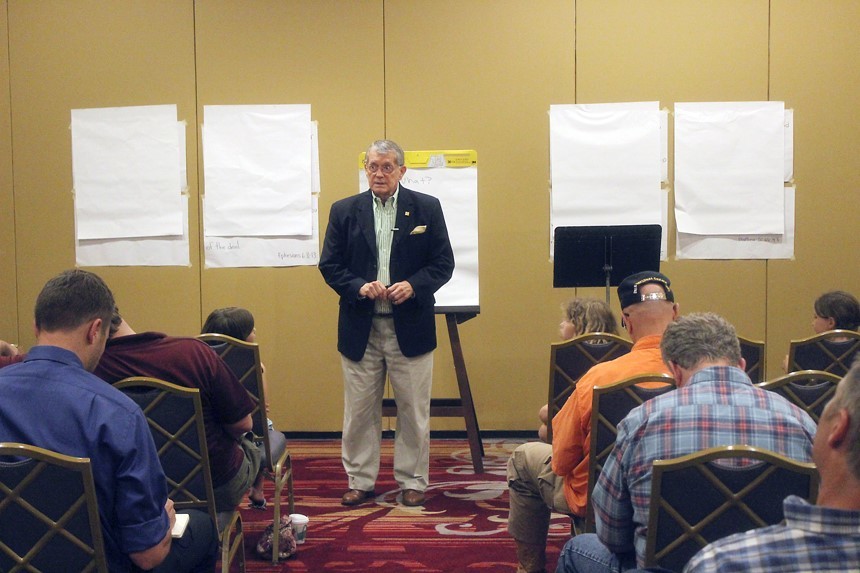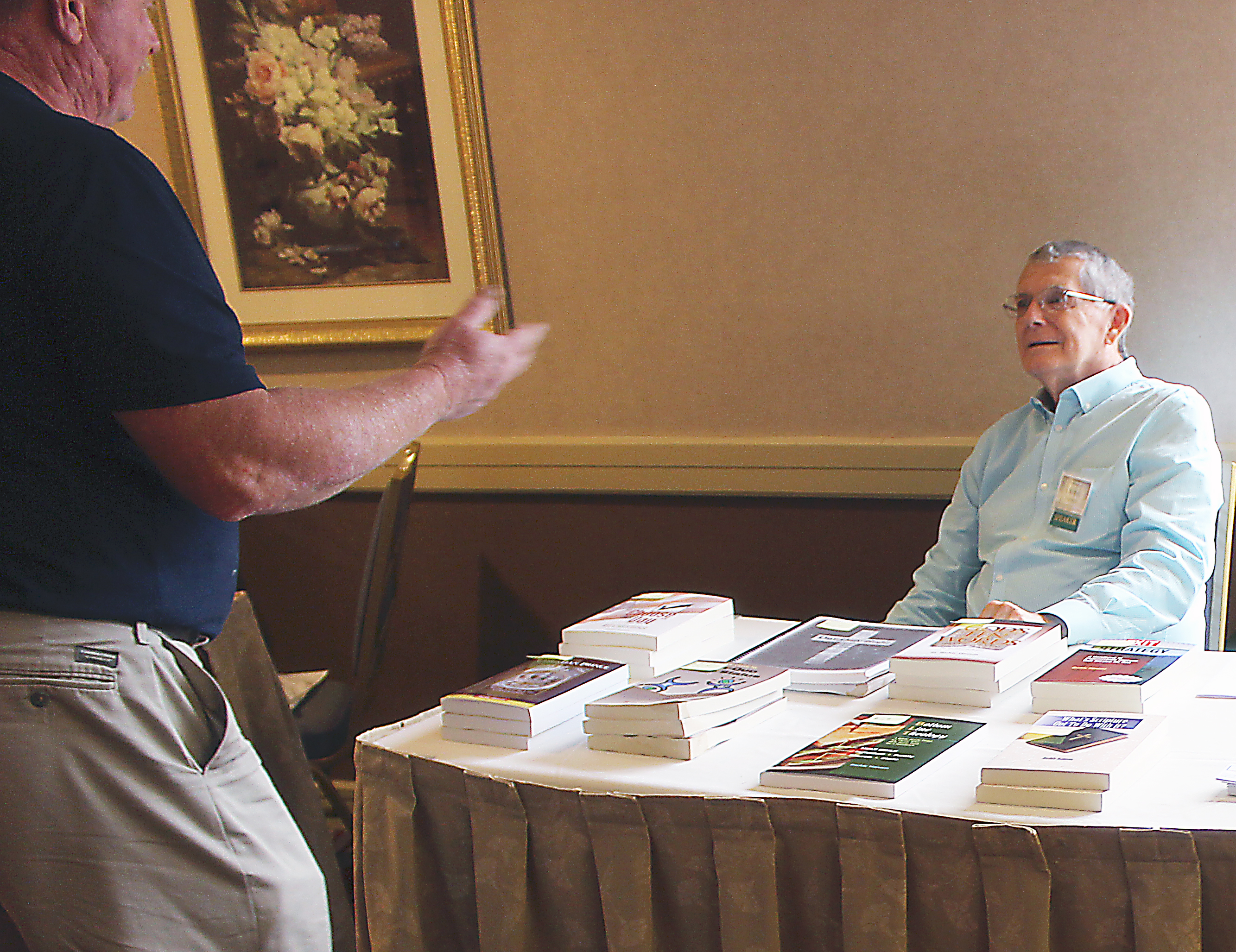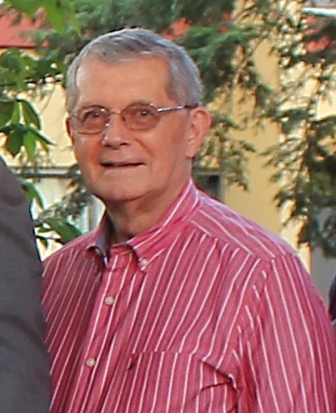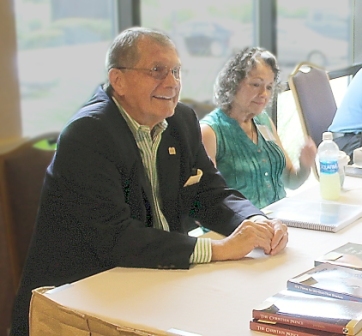Remembering Buddy Hanson
Those who knew Buddy Hanson realize exactly how much we all have lost by his departure to be with the Lord. Buddy was one of a very tiny handful of Christians who took the nuts and bolts of the faith so seriously that he was willing to dedicate his life to teaching them to others.

- Martin G. Selbrede
December 19, 1941 – September 17, 2018
Those who knew Buddy Hanson realize exactly how much we all have lost by his departure to be with the Lord. Buddy was one of a very tiny handful of Christians who took the nuts and bolts of the faith so seriously that he was willing to dedicate his life to teaching them to others. In that regard, Buddy was the polar opposite of the ivory tower type of theologian. To extend that analogy, he forged tools to build exercise equipment he’d put in the weight room he designed for coaching his fellow Christians to become ever stronger in His service.
Pastors, preachers, and theologians have long exploited the scriptural allusions to athletic contests before, but nobody ever made them as relevant and practical as Buddy did. His heart for God’s people reflected a fierce intensity, a singular focus upon equipping them not merely for battle, but preparing them for victory. It’s no surprise that the closest he came to writing an extended commentary (Thy Will Be Done On Earth, a commentary on Isaiah) reveals his fingerprints so clearly in its subtitle: Heavenly Insights for Down-To-Earth Living. Of course, his commentary on the Ten Commandments (God’s Ten Words) cannot help but focus on where the rubber hits the road.
When P. Andrew Sandlin pointed out that we need to build a new kind of Christian, we find that Buddy Hanson has providently hauled the right blueprints and tools to the job site. He’s ready to show us, in methodical detail, how to put off the old man and put on the new (without a single pietistic, navel-gazing lapse anywhere to be detected). At every opportunity, Buddy made sure we had our senses exercised to discern good and evil (Heb. 5:14).
One Career Prepares for the Next
St. Paul’s prowess as a tentmaker didn’t have a direct impact on history, but it had an impact on Paul in preparing him for the Lord’s work. By the same token, Buddy Hanson’s involvement with professional sports in the first half of his life would shape his subsequent ministry in profound ways. His achievements in the sports world are noteworthy in themselves, but for the Lord’s work they served as a crucible for helping him see critical needs and meet them head-on. He had gained a perspective on the practical aspects of the faith that few had, and even fewer had acted upon.
Buddy described the nature of these issues to me on November 25, 2008:
You know my complaint about the Reformed community ... very good at describing the issues, but very weak at prescribing God's solutions. If it weren't for the fact that only 5 percent of American Christians have a Christian worldview, your articles would set the stage for them to begin conforming their lives to Biblical ethics.
However, since they are clueless in how to do that, I'm afraid that your articles will only serve to frustrate them because they can't see a way out. This doesn't mean that they can't present an airtight case for postmillennialism to an amil or premil, but as for their lifestyle, they will continue to live as incipient amils. (And they probably don't even realize it!)
As Biblically accurate and well-written as these articles are, they will only lead our brothers and sisters to the water of how to live as a member of God's family and Christ's Kingdom ... but 95 percent of them don't know how to drink it!
Since you are one of the few heroes I have, and therefore only one of a few people who “gets it” about how to live as a Christian, I pray that you follow up each of these articles with a “This is how you and your family can begin to make a positive difference in this area” explanation.
Never forget, while the “how-to” may seem elementary to you, it is a foreign language to even our well-read Reformed friends, because all they do is read, discuss and debate and think that just because they are continuing to fine-tune their theology, that's all God expects of them. In other words, they view Chalcedon's excellent books as a non-Christian views nightly TV or a sporting event ... an escape from reality. For America to survive, if it can survive, we need to reduce our instruction time in half, and fill it with teaching.
As Buddy saw it, the work that we were doing at Chalcedon was necessary, but not sufficient:
The easy part is describing how different a Christian worldview and lifestyle should be from a non-Christian one. The challenge is to present these distinctive differences in a way that the typical 21st century Christian will appreciate and be convicted to repentance.
While Francis Schaeffer popularized the question, How Should We Then Live?, it was Buddy Hanson who labored to actually answer the question. So, he took up the mantle to stand in the gap.
Keep up the great work at Chalcedon. Y’all are Christianity's intellectuals, and I'm merely a blue-collar worker bee who does the best God allows to assist in disseminating y’all’s message to the masses.
But he was far more than a promoter of the work of others (although he surely commended valuable resources when appropriate). On his own volition, he chose to grapple with Niccolò Machiavelli, simply because no serious Christian attempts to do so were, in Buddy’s view, remotely satisfying. Standing toe-to-toe against Machiavelli’s The Prince we now have Buddy Hanson’s The Christian Prince, a long-overdue answer to a festering, centuries-old broadside launched by humanism:
Of all the Chalcedon disciples, I don't know why our Lord, Savior and King put a burden on my heart to provide the first refutation of Machiavelli’s work, but He did, and I pray that The Christian Prince gets wide distribution among not only our Christian brothers and sisters, who have political interests, but among CEOs (management by intimidation) and military leaders who assign Machiavelli's tactics in their advanced leadership courses.
Christendom will become more robust when she learns to counter a Machiavellian argument with a well-reasoned Hansonian rebuttal.
Buddy Was All About Ethics
How does one build a ministry around ethics? When Buddy Hanson founded his Grace & Law Worldview Resource Center, he had Christian ethics centered in his sights. His reasons for working this shamefully weak point of modern Christianity were tactical in nature:
In my talks and writing I don’t mention eschatology, because I know as soon as I do people will begin to either tune me out because my eschatology doesn’t fit their imagined paradigm, or not hear what I am saying because their mind is focused on trying to figure out how I could be so mistaken. Instead, I stress ethics. I believe that if we get the ethics correct, the eschatology will take care of itself. Besides, ethics doesn’t have the red flag that “end times” does, since many of our Christian brothers and sisters don’t know what ethics means.
Once I emphasize the promises that God makes and remind them that “ONLY God’s Word works,” and “Man’s word ONLY fails,” I place God’s theological ball squarely in their court for them to either “return” it with their obedience, or let it skip past them by ultimately saying that they trust more in their word than His. I’m certain this causes more than a few to squirm in their seats, but I want to stress that being a Christian is much more than joining a church and being nice to people.
For Buddy, ethics was not some isolated concern, but world-embracing in its import. It was the linchpin of a Biblical worldview anchored upon God the Creator, the Lawgiver, the Judge, the King, the Savior. He was patient enough to help others build a Biblical worldview one brick at a time, thereby making straight the crooked paths dominating our minds and lives. As he pointed out to me on September 20, 2007:
Probably the most difficult non-Christian virus for us to delete from our worldview after our conversion is the idea that somehow, we can still be “captains of our ship.” I don’t think we can stress too often, as you did, that “God will shape the future by shaping the hearts of the people,” and that “being future-oriented” is not “synonymous with seizing control of the future.”
Alabama’s new football coach is driving sports writers crazy with his comments on practices and the games. He refuses to talk about winning and losing, saying instead, “It’s the process that’s important. If we consistently do the things we’re supposed to do, winning will take care of itself.” I told our son that if that coach isn’t a Christian, he is doing a good job of stealing our presuppositions!
Living the Christian lifestyle is a process not an instantaneous or even a manufactured result. But, again, this is one of the many truths that congregations are not being taught.
Chalcedon has published at least nine articles written by Buddy Hanson, and all are gems of applied Christian wisdom (emphasis on applied). Our published audio interview with him conducted by Chalcedon’s Andrea Schwartz demonstrates his heart for God’s people wandering without vision; he makes it his business to train Christians to use their eyes anew.
Thank God It’s Monday
In response to every humanistic axiom, Buddy hit upon a Christian counter-response. The Thank God It’s Friday attitude showed up on his radar as a slacker ode to be confronted in God’s name. He set in motion a series of weekly email messages putting Biblical legs on the opposing assertion, Thank God It’s Monday, which showed up in one’s mailbox every Monday morning for ten years.
The 350+ installments in my Inbox (I missed only the first twelve) illustrate how Buddy implemented the principle of “line upon line, precept upon precept, here a little, there a little,” building a massive bulwark over the span of a decade while simultaneously writing books and lecturing.
Each year of TGIM installments covered a different theme to the hilt, and the themes dripped with practicality, providing a roadmap to victory. (If you can conquer Monday, the day too many dread, you’ve reconstructed the entire attitudinal framework of the modern out-to-lunch Christian.) His theme for 2010 gives a clue to his intent:
The messages for this year will build upon the theme of living out our faith by giving you a weekly Spiritual Bullet to use in shooting down the ungodly ideas that are so prevalent in our culture. Attached is Spiritual Bullet #1. May it help you to “crush Satan’s head!” (Genesis 3.15; Romans 16.20)
By year’s end (fifty-two bullets later) the reader has stockpiled a formidable ammo dump (provided he carefully read and used these valuable tools). Each year brought a new theme, presented line upon line, precept upon precept, inexorably chipping away at Monday’s bad reputation and re-framing it within God’s purpose for His Kingdom. Conventional wisdom says don’t buy an automobile built on a Monday or a Friday, but if Buddy had anything to say about it, Christian cars built on Mondays would be defect-free.
God Has No B-team
While sports metaphors and analogies abound in Buddy’s writings (because they accurately reflect the nature of our purpose in God’s world), one of the more significant points he made was that God has no B-team. He reiterated this point at every opportunity so nobody would miss it:
God has no B-Team. He has only one Team (Eph. 2:19–22, 1 Pet. 4:4–5 & 9–10) through which He brings about His will “on earth as it is in heaven” (Matt. 6:10), and as a Christian, you’re a full-fledged member! May you no longer live for yourself, but for Him Who died for you and rose again (2 Cor. 5:15).
In a very real, even vibrant, sense, Buddy saw his fellow Christians as part of a team, and he saw the team’s desperate need for competent coaching (which was not always provided from America’s pulpits). To illustrate this, one of the photos I’ve included here comes from the 2017 Future of Christendom Conference (sponsored by the Mid-Atlantic Reformation Society) showing Buddy speaking during his breakout session.
As a breakout speaker at the same event, I can assure you that most breakout speakers had a modest lectern and maybe a PowerPoint presentation to make their case. But Buddy’s approach was markedly different, indicative of his background in coaching sports. Sheet after sheet of paper came flying off the easel to be plastered behind him as he explained what we needed to do, what we were called to do, what we were commanded to do [1]. There was a palpable sense in the room of a concrete strategy being developed in real time, to be absorbed and applied by “every team member in the locker room.”

Buddy was not content until he had put the right worldview tools into the minds and hearts of his listeners, that they would then be doers of the Word. They would possess the right yardstick to measure their progress, and the church’s progress, in God’s world. Buddy measured his success by their success, which is why he tirelessly expanded the set of tools he was creating until the Lord dismissed him from his post.
Namesake of the Shark
According to the 1940 US Census, there were two Raphael Hansons in Tuscaloosa, Alabama. The older was born circa 1893, the younger was noted as 22 years of age. Buddy would be born a year after that census, the third Raphael Hanson to enter the world.
Raphael Andrew Hanson III was born and raised in Tuscaloosa, to be later known almost solely by the name Buddy Hanson. But this is not because he disliked his given name: it was actually a point of pride to him, as he shared with me:
As a third generation Southerner, and with my first name, Raphael, in honor of my great grandfather’s close friend, Raphael Semmes (the Shark of the Confederacy, who sank more Yankee ships than anyone else), I also appreciated your slam on General Sherman. As my coffee cup reads: “American by birth, Southern by the grace of God!”
As it turns out, this piece of history bears significance for our story. Buddy Hanson had something in common with his namesake, Captain Raphael Semmes of the CSS Alabama. As one reviewer noted of the captain’s extraordinary exploits on the high seas, “That Semmes and the Alabama become so successful is solely the product of Semmes, not the Confederacy.”[2] The parallel with our departed brother lies in this, that the covenantal productivity of many Christians today can be traced solely to the work of Buddy Hanson, not to the modern evangelical church. Just as the Confederacy failed to recognize the importance of naval battle, today’s church has neglected major theaters of engagement. So Buddy stormed the field alone.
The “Missing Man” Formation
When aircraft perform the missing man formation, a slot is either empty (denoting the missing man) or the jet in that slot pulls up out of the formation while the remainder continue flying at altitude. While we are painfully aware of the hole in our formation (even more so for the sake of his family and his loving wife, Sandra), we must bear in mind that Buddy bent over backwards to insure there’d be no hole where it really mattered most for the Kingdom’s future. He left behind a lasting legacy, and set the standard for any future leaders cut from the same cloth as he had been. His works do follow him, and they need to be multiplied now that he is not here to spearhead that effort. He operated, as Warfield would say, as “a man under orders,” and the time has come to pass the torch.
Buddy did have some projects in the works (e.g., Nordskog Publishing was awaiting a manuscript from him when word came of his departure). He had mentioned to me a project that, from all that I can tell, he either renamed or didn’t live to finish (although it is mentioned as a resource on page 195 of How to De-Program Yourself). The name of the project reflected Buddy’s sense of humor and his delight in appropriating pieces of popular culture and shaping them to his own purposes. It must have been long in planning, as he first shared word of it with me in June 2007:
By the way I so enjoyed your excellent feature in the latest Faith for All of Life that I quote you in a couple of places in the manuscript on which I am currently working, Return To Sinner. It is about practical divinity, and the title is a play on the Elvis hit, "Return to sender, address unknown, no such number, no such zone." The cover will use the design the post office uses for Return to Sender, but instead of using the reasons about which Elvis sang, I will list Obedience Due, No Difference in Worldview, No Change in Lifestyle, No Known Person. I'll send the chapter along when I clean it up and you can tell me how to attribute the quotes.
I was never to receive the chapter. Perhaps Buddy will show it to me when I see him again when it comes time for me to join the Church Triumphant.
His athletics background told him that wasted effort and wasted opportunities were to be avoided at all cost. As mentioned above, he was unwilling to surrender Mondays to the murmurers dragging their feet to resume their labors unto the Lord. Not surprisingly, he also noticed how verbal formalities (“How are you?” “Fine. Same old, same old.”) likewise represented wasted opportunities where we filled the air with empty gestures and trivialities. Such habitual waste didn’t sit well with Buddy, who provided hundreds of “Divine Comebacks” over the years to the question, “How are you doing?” Each one of his suggested responses painted the picture of someone leaning forward in the saddle, moving toward the finish line with honest passion.

It seems to me that were I miraculously able to ask Buddy, right now, how things are going, he’d likely reiterate the divine comeback he emailed out on September 26, 2011:
I’m “continuing in the things which I have learned.” (2 Timothy 3:14)
We have all been enriched by the life of this brother in Christ. Keep that flame burning by spreading it to the next generation while we still have breath to do so.
[1] It’s not that Buddy Hanson had a vendetta against trees, but rather that he was consumed with zeal for the Lord’s house.
[2] http://personal.tcu.edu/swoodworth/Robinson-SOTC.htm in reviews of Robinson III, Charles A., Shark of the Confederacy: The Story of the CSS Alabama (Annapolis, MD: Naval Institute Press, 1995).

- Martin G. Selbrede
Martin is the senior researcher for Chalcedon’s ongoing work of Christian scholarship, along with being the senior editor for Chalcedon’s publications, Arise & Build and The Chalcedon Report. He is considered a foremost expert in the thinking of R.J. Rushdoony. A sought-after speaker, Martin travels extensively and lectures on behalf of Christian Reconstruction and the Chalcedon Foundation. He is also an accomplished musician and composer.

